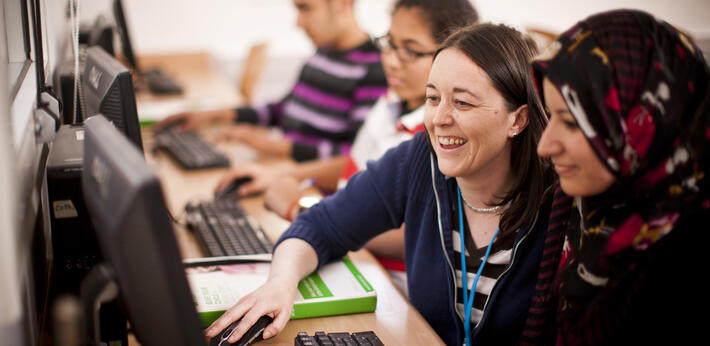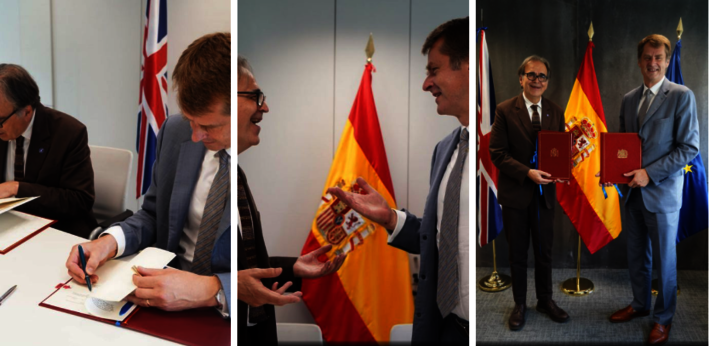You are here
Home ›03/06/2020
Europe - Covid-19 update - 03 June 2020
This post is to keep UK institutions updated on disruptions across the EU Europe region caused by the Covid-19 pandemic. For more information, updates, webinars and other engagement opportunities, please see ‘Europe and education: Stay connected during Covid-19’.
These posts focus on ten priority countries: Bulgaria, Cyprus, France, Germany, Greece, Italy, Ireland, Poland, Romania and Spain. This week: France, Germany, Greece, Ireland, Italy, Romania.
- France: Schools reopen except in Paris; measures discussed to support international students 2020/21.
- Germany: Schools reopen; government plans financial packages for research and incentives to support TVET.
- Greece: Pan-hellenic examinations to start on 15 June.
- Ireland: Visa rules modified for English language students; process starts to judge final school exams by predicted grades.
- Italy: Government Scientific Committee publishes draft rules for schools to reopen in September.
- Romania: Second bacalaureat and national assessment sessions for students severely affected by Covid-19.
If a country you’re interested in doesn’t appear here, or if you would like more details, please check previous weeks’ updates or contact the country representative.
- 27 May: France, Germany, Ireland, Italy, Romania, Spain
- 20 May: Bulgaria, Cyprus, Germany, Greece, Ireland, Poland, Romania, Spain
- 13 May: Cyprus, France, Germany, Italy, Ireland, Romania, Spain
- 6 May: Bulgaria, Cyprus, France, Germany, Greece, Romania
- 29 April: Cyprus, France, Germany, Greece, Italy, Poland, Romania
- 22 April: Germany, Greece, Spain
- 16 April: Bulgaria, Cyprus, France, Romania
- 8 April: Bulgaria, Cyprus, France, Greece, Italy, Poland, Romania, Spain
IELTS tests have been affected in all countries in Europe as a result of Covid-19 precautions. For the latest update by country, please check: https://www.ielts.org/news/2020/changes-to-ielts-test-arrangements-in-some-locations-due-to-novel-coronavirus. We are monitoring the situation very closely and will continue to provide updates as the situation develops.
For more Europe updates, webinars, market insights and other services in international higher education, please go to your alerts settings and select updates by region from Europe.
If you have any feedback, please contact me or any of the country staff listed below.
Thank you - and stay safe.
Almut Caspary – Higher Education and Research Lead, EU Europe (Almut.Caspary@britishcouncil.org).
Updated 2 June
Phase two of 'deconfinement' in France began on 2 June with the reopening of bars, restaurants, theatres, museums, parks and beaches under certain conditions. Cinemas will reopen after 22 June, again under social distancing conditions. The Paris region has stricter conditions than the rest of France as it is marked as an 'orange area' with a higher incidence of the virus.
School and university closures
All schools are allowed to reopen except for general (non-vocational) higher secondary schools in the Paris region.
Universities will stay closed until September.
Examinations
The French oral exam that would usually take place at the end of the penultimate year of secondary school and which counts towards a student's final baccalaureat grade has been cancelled and replaced by an average score based on continuous assessment.
Remote and online academic provision
The French government is discussing a more secure legal framework for distance learning for the new academic year, especially regarding image rights and intellectual property.
HEIs are working on an hybrid model of online/offline teaching for the new year.
International students
Campus France and several ministries (including ministries of higher education and foreign and internal affairs) are working as a matter of urgency on solutions to provide international students with the best access to online courses and resources by the beginning of the new academic year. This is crucial for some schools or diplomas.
Other insights
An internal report from a trade union representing school and university staff has stated that distance learning may have resulted in a 30 to 80 per cent loss in efficiency compared with face-to-face learning. The union has recommended better tools and specific training for teachers and academics.
A survey of students by Ifop/Canévet indicates that 49 per cent are not in favour of a full year of distance learning, with only 18 per cent saying they are fully prepared for such a year.
Contact
For more information about France, please contact Catherine Saracco (Catherine.Saracco@britishcouncil.fr).
Updated 2 June
Important note: Education in Germany is largely devolved to the 16 federal states. This means that although there are agreed Germany-wide principles, there are differences in dates of exams, holidays and regulations for schools and higher education institutions.
Germany is continuing to relax lockdown measures in phases. Face masks are mandatory across Germany when using public transport or in shops. New regulations on meetings of more people from different households have been introduced. Restaurants, museums, gyms and other establishments can reopen under certain conditions, with considerable differences across the federal states.
Schools and university closures
Primary and secondary schools and universities are gradually reopening. The aim is that all pupils will return to school in person at least once by the start of the summer holidays (end of June in some states).
There are differences across the country with regards to the approach to reopening universities. Some are expecting to teach mostly online until at least 2021, while others are saying they plan to allow students to return to campus in the autumn. Some universities are also toying with the idea of delaying the start of the winter semester.
Meanwhile, university applications and admissions processes for the 2020/21 intake are starting.
Financial support
The federal minister for education and research has proposed a €10 billion stimulus package for research and development in future technologies (e.g. hydrogen technologies), AI, climate change and medical sciences.
Steps are being taken to ensure that trainees in Germany’s traditional dual TVET routes are able to continue and finish their training despite the pandemic and ensuing economic downturn. Examples include financial incentives from the federal government to companies taking on trainees from other companies that were forced to close during the pandemic or went bankrupt as a result of it. Further investment will be made to ensure enough traineeships are available in the next couple of years as this route is seen as one of the 'backbones' of Germany’s economic success.
The federal Ministry of Education has launched interest-free loans of up to €650 per month for students who are struggling financially as a result of the Covid-19 pandemic. It will also create a €100 million relief fund for the hardest hit students. There has, however, been continued criticism (including from the junior coalition partner) of the loans in terms of accessibility for international (and EU) students and that they are taking too long (first payments are to be in July when many students expect to be able to work again).
Examinations
Abitur (A level equivalent) grades are to be issued from the end of June. There are calls for universities to grant special dispensation to applicants if their grade averages are significantly lower than in previous years (an unusual move in Germany as special consideration is not a measure normally used).
Other insights: Media
There is continued coverage of the high number of Covid-19 cases and deaths in the UK.
There also continues to be some media coverage of the likely impact of the pandemic on international student mobility to the UK, and the financial consequences this may have for higher institutions in the UK and other countries with student fees.
Contact
For more information about Germany, please contact Ailsa Kienberger (ailsa.kienberger@britishcouncil.de).
Updated 2 June
Greece is lifting lockdown and has laid out policies to restart its tourism sector from 15 June with testing and quarantine measures based on where visitors arrive from. Greece will open to international flights on 15 June, allowing visitors from an initial list of 29 countries to enter the country without being tested or quarantined. Year-round hotels were allowed to reopen on 1 June.
School and university closures
Nursery and primary school children returned to class from 1 June.
Examinations
National (pan-hellenic) examinations for access to higher education are due to start on 15 June.
Greek universities are preparing to deliver their own summer examinations using a combination of remote and physical means. Where physical exams prove essential, universities are expected to issue guidance to safeguard public health.
Contact
For more information about Greece, please contact Maria Tsakali (maria.tsakali@britishcouncil.gr).
Updated 2 June
Ireland is due to move to the second phase in lifting of social distancing measures on 8 June, as per the country’s roadmap.
School and university closures
Since 18 May, school and university buildings have been open fot staff to deliver remote teaching and other support to learners. Anecdotal evidence suggests that only a small number of staff are attending for short periods to carry out essential tasks and retrieve materials. The academic year for third level and post-primary education has ended. There is speculation that ‘July Provision’ (additional time in school for primary students with special educational needs) may take place in some format in July.
Examinations
The predicted grades process that is being used to judge this year's final school exam results is underway. Registration for the system for students has now closed, with 60,035 out of 61,029 students who had originally entered for the exams having registered.
A leaked report from Higher Education Authority predicts a large number of student deferrals for the 2020/21 academic year. There is speculation that universities may seek to cap the number of deferrals possible.
Student financial support
The Union of Students of Ireland has called for a complete overhaul of the Student Support systems (SUSI).
Remote and online academic provision
Several universities are announcing some details of their plans for the first term of the 2020/21 academic year. However, no overall picture has yet emerged.
International students
The Department of Justice has amended visa conditions for English Language students from outside the EU who have been affected by Covid-19. Students will be allowed to remain as long as they re-enrol in an online course of study for the remainder of the academic year. Students who left Ireland before completion of their studies due to Covid-19 may return and resume their studies.
Under current guidelines, English language students can study for a maximum of two years in Ireland on a visa which allows them to work in casual employment for a maximum of 20 hours per week during school term and 40 hours per week during holidays. Language students, whose visas were due to expire between 20 May and 20 July, have had their visas extended by two months.
Communication with students
A campaign has been underway to ensure that students completed the registration process for predicted grades before the deadline last week.
Other insights
Major news in Ireland this week is that a merger has been approved between Cork Institute of Technology and the Institute of Technology, Tralee, establishing the new Technological University Munster (TUM). TUM will be the second technological university in Ireland after TU Dublin.
Contact
For more information about Ireland, please contact Mags Walsh (mags.walsh@ie.britishcouncil.org).
Updated 1 June
School and university closures
The Government Scientific Committee has put together a document with general indications about the conditions under which schools may reopen in September. In the coming weeks the government plans to analyse the school situation and allocate funds. Schools have been asked to map their spaces and prepare a preliminary reorganisation of their internal spaces. However, it is important to underline the autonomy that schools and headteachers have when it comes to implementing institutional guidelines.
Some of the measures suggested in the Government Scientific Committee's document include:
- Social distancing (a distance of at least one metre in the classrooms and at least two metres when doing physical activity)
- Use of school spaces only for teaching activities
- Limits on group sizes and the use of outdoor spaces for recreational time
- Children from six years old having to wear masks for the whole school day
- Hygiene rules for environments and individuals
- Temperature checks will not be necessary when entering schools
- Distance learning will represent a supplementary and not a substitute form of teaching
- Schools will be obliged to communicate the measures they plan to take clearly. An example of a communication to be posted in school buildings could be:
The five rules for safe return to school:
- If you have symptoms of acute respiratory infections (fever, cough, cold), talk to your parents immediately and DON'T come to school.
- When you are at school, wear a mask such as a cloth mask to protect your nose and mouth.
- Follow the instructions of teachers and respect the signs.
- Always keep a distance of one metre, avoid crowding (especially on entry and exit) and avoid physical contact with your classmates.
- Wash your hands frequently and use the disinfectant dispensers to keep your hands clean; avoid touching your face and your mask.
Contact
For more information about Italy, please contact Filomena Casamassa (Filomena.Casamassa@BritishCouncil.it).
Updated 2 June
Romania continued to relax lockdown rules on 1 June, with the reopening of outdoor cafes seen as the biggest step towards a return to normal life since restrictions were imposed in mid-March, albeit with a maximum of four people to a table (unless it’s a family) and two metres between tables. Beaches also reopened on Monday, with deckchairs two metres apart. Outdoor concerts and other cultural events are resuming with a maximum of 500 spectators; some sporting competitions can also take place, although not contact sports such as football, volleyball or rugby. There is speculation that another round of relaxation measures could come on 15 June, possibly including the reopening of malls and gyms. This all depends on whether the number of cases continue to decline in Romania.
School and university closures
Romania reopened schools for two weeks from 2 June for students in the eighth, 12th and 13th grades who have significant exams. Attendance is optional and based on parental self-assessment. Those who do return will have exam preparation and counselling sessions as opposed to classes.
Examinations
The bacalaureat end-of-school/pre-university assessment is due to take place between 22 June and 4 July, while the national assessment for eighth grade students is due to begin on 15 June.
At the end of May, President Klaus Iohannis announced special second sessions of the bacalaureat and national assessment for students who are ill, in isolation or in quarantine during normal examinations. Tentative dates for the second session of the bacalaureat, announced by Minister for Education Monica Anisie, are:
- 29 June-3 July: Applications
- 6-9 July: Written tests
- 10-12 July: Results
The second session of the national assessment is due to begin on 29 June.
News of this announcement is available here (in Romanian).
Contact
For more information about Romania, please contact Gabriel Ivan (gabriel.ivan@britishcouncil.ro).
- Bulgaria: Ivaylo.Slavov@britishcouncil.bg
- Cyprus: pantelitsa.michael@cy.britishcouncil.org
- France: Catherine.Saracco@britishcouncil.fr
- Germany: ailsa.kienberger@britishcouncil.de
- Greece: Maria.Tsakali@britishcouncil.gr
- Italy: Filomena.Casamassa@BritishCouncil.it
- Ireland: Mags.Walsh@ie.britishcouncil.org
- Poland: Julia.Plachecka@britishcouncil.pl
- Romania: gabriel.ivan@britishcouncil.ro
- Spain: Carolina.Jimenez@britishcouncil.es






